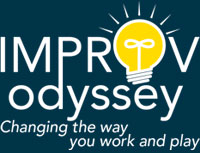The Art of Sidecoaching
The most subtle and essential element in Spolin Games is sidecoaching. The sidecoach is at once a fellow player, a grounded teacher and a canny director.
Sidecoaching is as much a skill as it is an art. It therefore requires the same intuitive ability evoked by playing. In addition, the sidecoach has to also be familiar with the advanced levels of playing. This means a good sidecoach must have a substantial amount of experience playing most of the Games in Spolin’s canon, hopefully with a good sidecoach to help you make the most of them. I was lucky. I had Viola Spolin herself as a coach and mentor.
Where can a teacher gain this experience?
This only comes through lots of play with the support of a good sidecoach.
Through playing and coaching the sidecoach becomes familiar with what works and what doesn’t. Without someone like Viola to guide you, (except by her book) one needs to accumulate enough experience through play and trial and error mindful of the traps; of showing how instead of allowing the players to grapple with the problem (with support from you). By being a detached observer rather than being a fellow player. Acknowledging what works and what doesn’t while playing and coaching the game. “Hmmm. That one worked… Oh, that didn’t do it.” Knowing what you are shooting for is that spontaneous release of energy true play sparks.
It is also important to use words and phrases that will assist the player at the moment of playing to heighten the involvement in the game and focus.
Viola was very careful to use words of empowerment rather than authoritarian laden words. Phrases like ‘Do it this way’ or ‘It’s like this’ or ‘Don’t do it like that’ all come from an Authority with a capital A.
Action words like ‘use your where’, ‘heighten what’s going on!’ ‘Let the space support you’, ‘keep the space between you!’ are prompts to action rather than directions on what to do. A lot of it comes with experience and a desire to let the game do the teaching.
Observation of the student/players’ participation in a game requires a moment-to-moment diagnosis of several things:
- The resistance exhibited by one or more of the players during play.
- The interaction (or lack thereof) between the players.
- An understanding of what the game is capable of producing. (hard to do if you’ve not seen it work before)
- A familiarity with the variety of coaching phrases that might produce either more energy, less urgency, more connection, or more detachment depending on what might be called for. This is often an intuitive and reflexive response by the sidecoach.
- A familiarity and empathy with the problems faced by the student inside the game based upon the teacher’s own experience playing and/or coaching the game.
The side coach must always be aware and involved with the players as a fellow player! – Encouraging them to become fully involved with the focus, careful not to dictate, nag, or barrage them with unnecessary words.
There are a lot of obstacles and traps for a side coach:
- Ego
- Urgency
- Not understanding the problem posed by the game or its potential
- No rapport with the players’ experience inside the game
- Not enough understanding or familiarity with the variety of sidecoaches
It is valuable to know the game from the player’s perspective. Playing a variety Spolin games will educate you to the problems faced by your students and expand your personal experience. Playing will give you a deeper understanding of yourself, the philosophy, and heighten your own self awareness while at the same time, reducing your reliance on intellectually understanding the games and their purpose. Instead you will get a direct experience of the games for you will be transformed by the playing.
This is extremely valuable for you as a teacher/director/workshop leader on many levels. Once you have gained this level of playing and understanding, you stand ready to begin your career as a sidecoach.
The book and the writings of Viola Spolin will continue to be a source for you. The wisdom is there to be mined continually. It is not a book to read through once. It’s because she wrote her prose with a profound knowledge of the players experience and resistances as well as guiding the teacher from her vast experience as a teacher/director. She addresses both the enlightened teacher and the resistant (but open minded) teacher.


